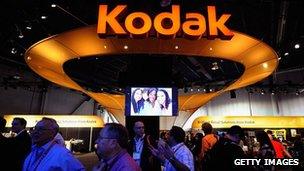Bankrupt Kodak sells off patents to investors for $525m
- Published

Kodak helped pioneer digital photography, but saw other firms secure most of the industry's profits
Eastman Kodak has sold its digital imaging patents to a consortium of bidders, which includes Google and Apple, for $525m (£322m).
Kodak said 12 intellectual property licensees, external led by Intellectual Ventures (IV) and RPX Corp bought the patents.
The photography pioneer has sold the patents to pay creditors after filing for bankruptcy in January.
The bids for the roughly 1,100 patents up for sale fell short of a $2.6bn target.
Companies participating in the consortium buying the patents include Apple, Microsoft, Google, Samsung, Adobe, Facebook, Amazon, Shutterfly, BlackBerry-maker Research In Motion, Fujifilm, HTC and Huawei Technologies.
IV and RPX are so-called "patent aggregators" which dedicate themselves to buying and then licensing out patent rights.
In the initial stages of the bid process IV and RPX had formed two rival consortiums to purchase Kodak's patents, with Apple backing IV and Google behind RPX, before they decided to collaborate.
'Major milestone'
The agreements are subject to approval by the US Bankruptcy Court in Manhattan.
"This monetisation of patents is another major milestone toward successful emergence," said Kodak's chairman and chief executive officer Antonio Perez.
"This proposed transaction enables Kodak to repay a substantial amount of our initial DIP loan [loans used to turn around a business], satisfy a key condition for our new financing facility, and position our commercial imaging business for further growth and success."
The patent portfolios on sale include ways to let devices capture, process, edit and transmit images.
Kodak filed for Chapter 11 protection in January. Chapter 11 refers to a section of the US Bankruptcy Code. It protects a company from its creditors, giving it time to reorganise its debts or sell parts of the business.
Kodak filed a motion to sell several of its patents in June after pulling out of the digital camera business to focus on making printing equipment. It plans to exit bankruptcy in the first half of 2013.
- Published7 August 2012
- Published3 July 2012
- Published12 June 2012